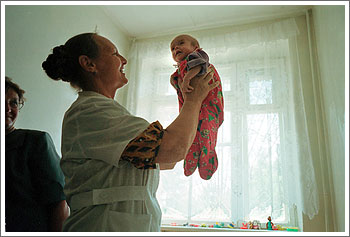
AIDS prevention lectures are being held in Irkutsk schools.
 AIDS prevention lectures are being held in Irkutsk schools. |
Heroin has proven the deadly catalyst in this epidemic. Officials here attribute most of the cases to sharing needles for intravenous drug use. The drug comes from Afghanistan and Tajikistan, far to the west of Irkutsk, and is distributed throughout Siberia from the city of Novosibirsk. Currently Irkutsk ranks 4th in Russia by absolute number of registered cases.
Irkutsk's 10,000 reported AIDS cases (2001) among a population of approximately 700,000 of population places it at approximately the same rate as the U.S. city of Philadelphia, PA (18,348 cases among 1,517,550 population). Still, some U.S. cities (Washington, D.C. 22,321 / 572,059; San Francisco 27,567 / 776,733) - exceed this rate by far, not to mention the catastrophic AIDS infection rate in Miami - 23,521 cases out of 362,470 city residents (resouces: AIDS Statistics, U.S. Census Bureau).
There is a signifficant difference between the pattern of the epidemics in
the U.S. and Russia. While racial and ethnic groups account only for about 25
percent of the U.S. population, they account for more than 50 percent of all
AIDS cases. And while overall AIDS deaths are down, AIDS remains the leading
killer of African-Americans age 25-44. This disparity has its roots in social
inequality in terms of unequal access to education and medical services and
the "ghettoization" of the cities. In Irkutsk, on the other hand,
the HIV infection affects white teenagers who consume so called recreational
drugs - independent of their living area or social status. This "helps" to focus
the anti-AIDS efforts. The recentness of this infection, which was barely present
in the area before 1999, remains a huge problem, however.
The main effort of local health authorities and activist groups is concentrated on propaganda against the primary AIDS-related risks - drug addiction and unsafe sex.
The first actions the regional administration took were creating a "narcotic police" unit, issuing educational brochures and leaflets, and starting a promotional campaign against drugs and for a healthy lifestyle. The Infection hospital opened a lab which offers free, anonymous blood tests. An AIDS center was also opened at this hospital.
The federal program "Antispid" (Anti-AIDS) started 3 years ago. The budgeting of the program has tripled from the previous year. In theIrkutsk region the main efforts are concentrated on high risk groups and include focused prevention information campaigns, yearly diagnostics, and anti-spreading activity. The federal program has shown the first positive effects on the statistics in the Kaliningrad and Moscow regions.
In Irkutsk the Infection municipal hospital has established a department for children born with AIDS. Alexandra Denyak is the head of the facility. Two years after HIV came to Irkutsk, doctors and nurses have learned how to handle the babies. Caritas, the Catholic charity, has made significant contributions of equipment. A new AIDS ward has been regularized and made part of the normal routine of the hospital.
 Alexandra Denyak
|
|
 Private activist groups include
"Siberia Without Drugs," which developed a rehabilitation program led by Dr.
Maksim Medvedev. Another group is called "Siberian center of social projects,"
led by Vitaly Gaskin. The group organized a one-day street festival called "Execution
of drugs." The activity was held in August 2001 on the Angara bank and
was attended by thousands of citizens. It included a concert by the rock band
"Udacha." A symbolic syringe was executed by fire.
Private activist groups include
"Siberia Without Drugs," which developed a rehabilitation program led by Dr.
Maksim Medvedev. Another group is called "Siberian center of social projects,"
led by Vitaly Gaskin. The group organized a one-day street festival called "Execution
of drugs." The activity was held in August 2001 on the Angara bank and
was attended by thousands of citizens. It included a concert by the rock band
"Udacha." A symbolic syringe was executed by fire.
 A Russian-French conference on "current
HIV, AIDS and concomitant infection problems" was held in May 2001 in Irkutsk.
A group of French medical specialists were invited to the conference because
Siberian specialists are interested in knowing how France has dealt with the
AIDS crisis.
A Russian-French conference on "current
HIV, AIDS and concomitant infection problems" was held in May 2001 in Irkutsk.
A group of French medical specialists were invited to the conference because
Siberian specialists are interested in knowing how France has dealt with the
AIDS crisis.
In France the epidemic started some 20 years ago. Professors from the universities of Lion and Grenoble shared their experience in handling HIV patients and prolonging their life expectancy. Usually the so-called "opportunistic infections" kill the patient, whose immune system is weakened by the disease.
Anothor important topic was the prevention of risks to medical professionals,
who may contract the infection from patients' blood, etc.
 Irkutsk Red Cross and the foundation "Global
Protection" have started an anti-HIV lecture program. The volunteer youth group
"Altair" is giving lectures at schools and in colleges. These volunteers discuss
with the pupils the symptoms of the disease, ways it is transmitted, and how
to protect yourself. They focus in particular on how people get started consuming
drugs, what the social risks are, and ways of staying away from drugs.
Irkutsk Red Cross and the foundation "Global
Protection" have started an anti-HIV lecture program. The volunteer youth group
"Altair" is giving lectures at schools and in colleges. These volunteers discuss
with the pupils the symptoms of the disease, ways it is transmitted, and how
to protect yourself. They focus in particular on how people get started consuming
drugs, what the social risks are, and ways of staying away from drugs.
Sources: Washington Post, New York Times, U.S. Census Bureau, AS Baikal TV.
Copyright © WWW Irkutsk 1995-2001